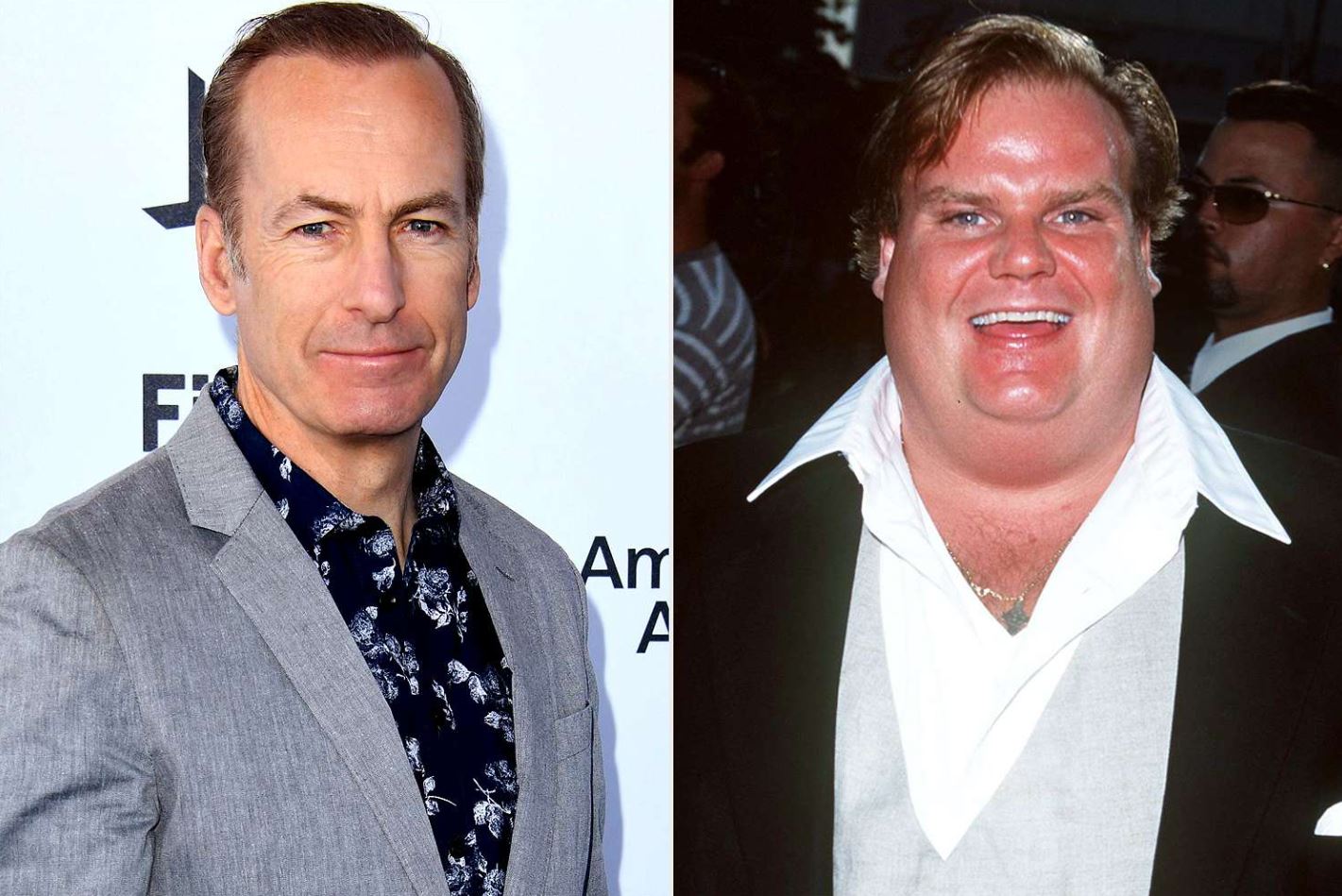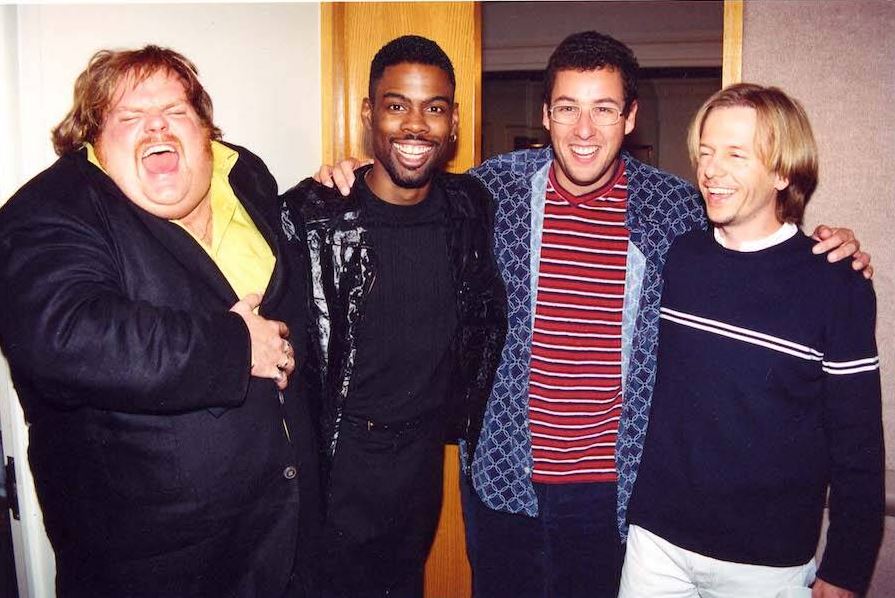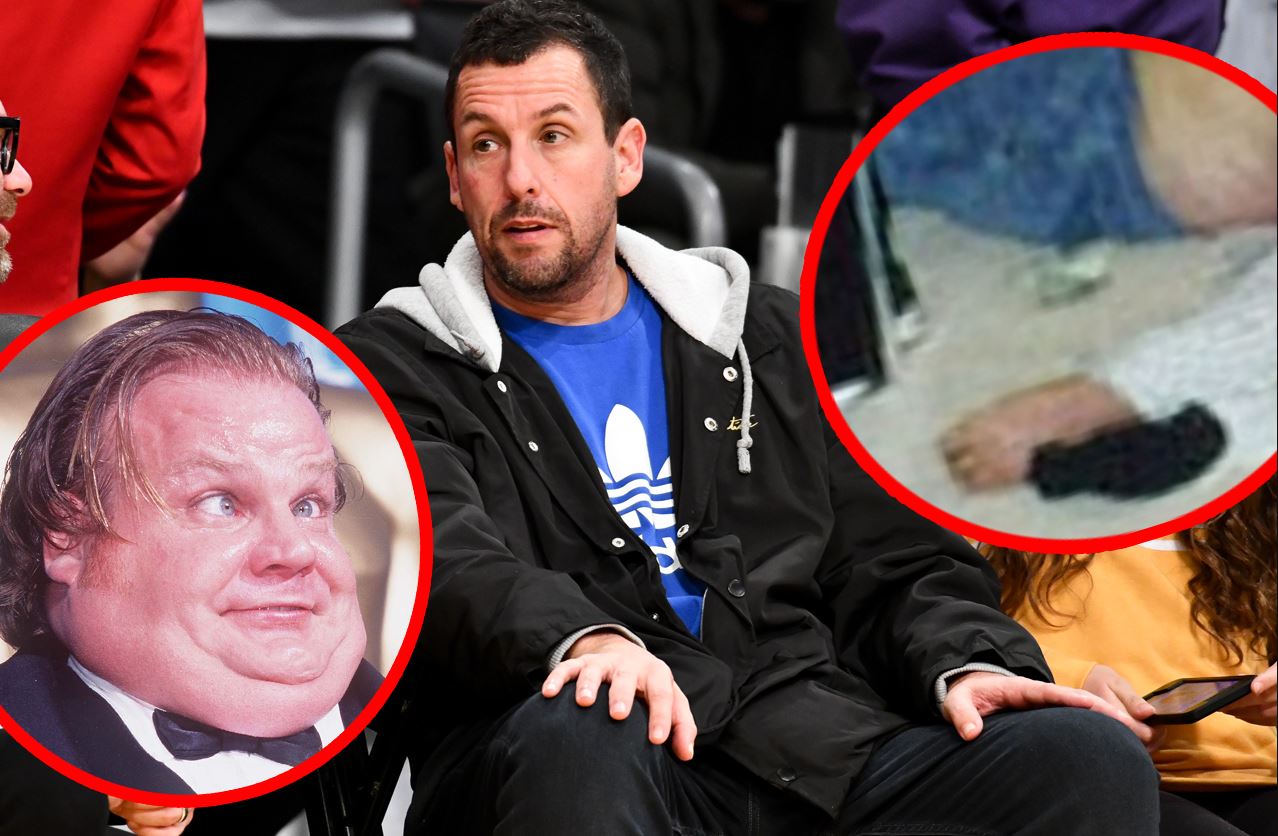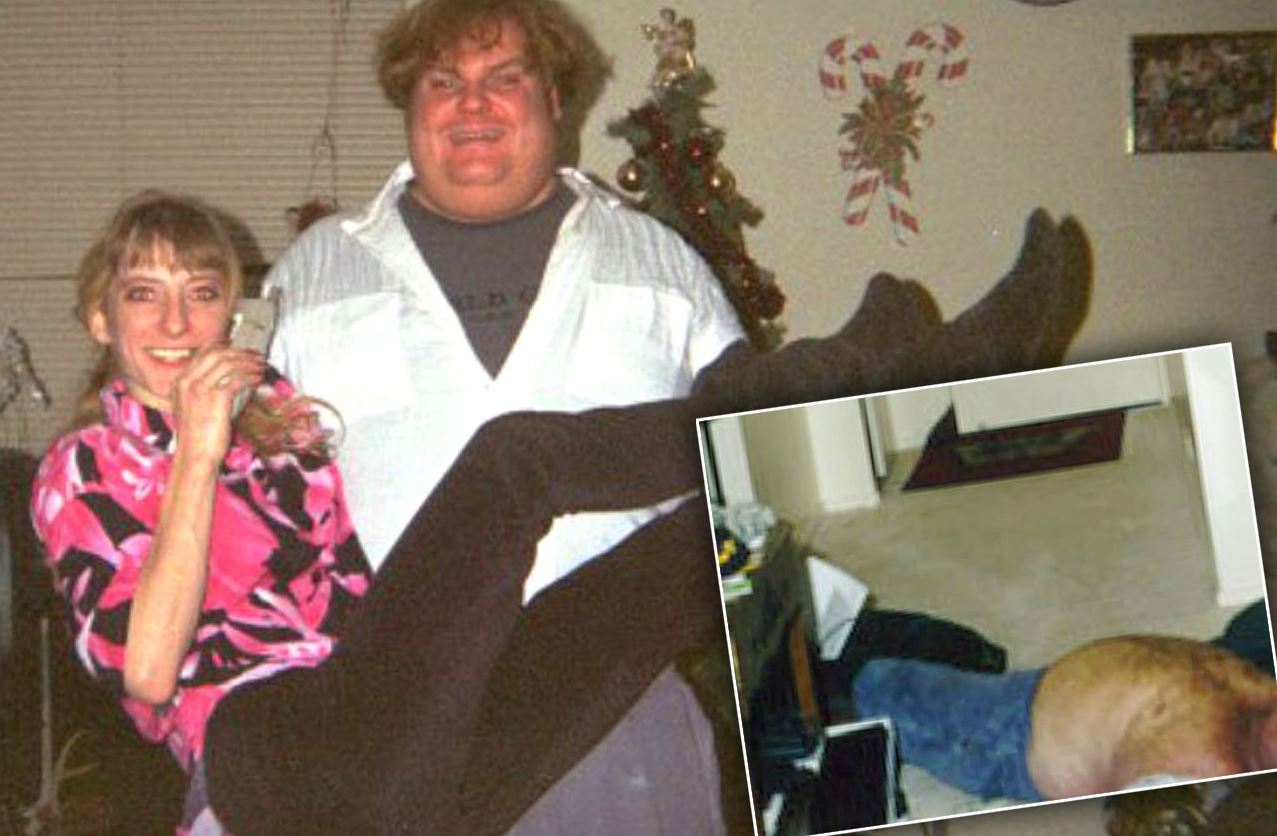Tragic End The Final Days of Chris Farley Death Photo
Chris Farley, a name synonymous with uproarious laughter and boundless energy, was a comedic force during his all-too-brief career. Born on February 15, 1964, in Madison, Wisconsin, Farley found his calling in comedy and quickly made a name for himself with his larger-than-life personality and his incredible knack for physical comedy. Rising to fame as a cast member on “Saturday Night Live” (SNL) from 1990 to 1995, he created a range of memorable characters that captured the absurdity and heart of American culture. The tragic end of his vibrant life is often somberly recalled through the controversial ‘Chris Farley death photo’.
Beyond SNL, Farley enjoyed success in films, notably in roles that played to his strengths as a physical comedian, such as the lovably clumsy motivational speaker in “Tommy Boy” and the sweet-natured but hapless title character in “Black Sheep.” His comedic style, often compared to his idol John Belushi, combined an intense physicality with a vulnerable sincerity, making his characters both laughable and endearing.
However, beneath the surface of his meteoric rise and public persona, Farley struggled with significant personal issues. His battles with obesity and drug and alcohol addiction were well-known within his close circles and often reflected in his public appearances. This was poignantly evident during what would be his final guest appearance on SNL on October 25, 1997. Returning to the stage where he had once shone, Farley’s performance was overshadowed by his visibly deteriorating health. His voice was hoarse, his skin flushed, and his timing, once impeccable, now seemed off. This appearance sparked concern and conversation among fans and the media about the toll his lifestyle was taking on his health. Just a few weeks later, the entertainment world would mourn the loss of a comedic genius who had brought so much joy to so many.
| Aspect | Details |
|---|---|
| Early Life and Career Beginnings | Born on February 15, 1964, in Madison, Wisconsin. Chris Farley discovered his comedic talent early and pursued a career in comedy, leading to his role on SNL. |
| SNL Fame | Served as a cast member from 1990 to 1995, creating memorable characters that became a staple of his comedy repertoire. |
| Film Career | Starred in successful films like “Tommy Boy” and “Black Sheep,” showcasing his physical comedy and ability to portray loveable yet flawed characters. |
| Personal Struggles | Struggled with obesity, drug and alcohol addiction, which impacted his health and professional work, particularly evident in his final appearance on SNL in 1997. |
| Legacy and Tragic End | Chris Farley passed away on December 18, 1997, at the age of 33. His death was a significant loss to the comedy world and highlighted the pressures faced by public figures. |
Contents
Farley’s Health Struggles
Chris Farley’s comedic brilliance was overshadowed by his lifelong struggle with health issues, particularly obesity and substance abuse, which became as much a part of his public persona as his humor. Despite his vibrant and energetic comedic style, behind the scenes, Farley faced serious health problems that affected him both personally and professionally. His physical condition was often the subject of his own jokes, but it masked deeper issues.

Throughout his career, Farley’s battle with weight was evident, and it was a struggle that he shared openly. His obesity was not just a matter of physical appearance but also impacted his overall health, contributing to other complications. Alongside this, Farley’s substance abuse issues were severe and persistent. Known for his excessive lifestyle, especially with drugs and alcohol, these habits began to take a toll on his professional work and personal life.
Farley’s struggles with addiction were public knowledge, and he entered rehabilitation centers 17 times in an attempt to overcome his dependencies. Despite these efforts, his pattern of abuse was cyclical, with periods of sobriety followed by relapse. Each stint in rehab represented a hope for recovery, but also a deep-seated battle with addiction that Farley found difficult to win. The support from friends and colleagues was constant, yet the challenges he faced were daunting, illustrating the often hidden struggles of those living in the constant glare of the public eye.
| Health Issue | Impact |
|---|---|
| Obesity | Farley’s weight was a constant struggle, affecting his physical health and contributing to complications. His obesity was often the subject of his jokes, reflecting a public persona that belied his personal challenges. |
| Substance Abuse | Known for his excessive lifestyle, Farley’s abuse of drugs and alcohol took a toll on his professional performance and personal well-being. His battles with addiction were severe, marked by multiple stints in rehabilitation centers. |
| Attempts at Rehabilitation | Entered rehabilitation centers 17 times, reflecting his serious efforts to overcome addiction. Despite periods of sobriety, Farley’s recovery was hindered by cycles of relapse, underscoring the challenges of his addiction. |
| Support System | Received constant support from friends and colleagues, which highlights the community effort to help him manage his addictions. However, the effectiveness of this support was challenged by the recurring nature of his substance abuse issues. |
Final Weeks and Downward Spiral
The last weeks of Chris Farley’s life were marked by a significant and visible decline, culminating in a series of events that underscored his worsening condition. Beginning on December 14, 1997, Farley’s behavior grew increasingly erratic and desperate. Known for his partying, the final days saw an intensification that worried those close to him.
Farley’s journey through Chicago’s nightlife became more frenzied. He was reportedly hopping from one bar to another, consuming large amounts of drugs and alcohol. Acquaintances noted a change in his demeanor; the once jovial and life-of-the-party comedian seemed to be spiraling out of control. His interactions varied from boisterous to somber, as he engaged with a mix of friends and strangers, including party girls and others drawn by his celebrity status.

On the night of December 15, Farley made an appearance at the 38th-anniversary party of Second City, the Chicago improvisational comedy troupe that had been a stepping stone in his career. Witnesses recalled him being lively and the center of attention, yet there was a palpable sense that he was not himself. He was drinking, though not to the point of being drunk, and his energy seemed forced. The following day, he unexpectedly canceled plans, including a haircut appointment, choosing instead to stay at his apartment.
According to reports, including an interview with a call girl who was with him on the afternoon of December 16, Farley’s condition was dire. He was using marijuana and drinking heavily, and his conversation focused increasingly on acquiring more drugs, particularly cocaine. This call girl noted that Farley was restless, moving aimlessly from room to room, a sign of his inner turmoil and escalating crisis.
These accounts paint a picture of a man in the throes of a severe personal crisis, overshadowed by his public persona. His final days were a tragic tableau of a life that, while full of public success and adoration, was privately fraught with pain and struggle. The joy he brought to others through his comedy was in stark contrast to the path he walked in private, a path that ultimately led to his untimely death.
| Date/Period | Event/Behavior |
|---|---|
| Early December 1997 | Farley’s behavior became increasingly erratic and desperate. Known for his partying, the final days saw an intensification that concerned those close to him. |
| December 14-16, 1997 | Reportedly hopping from bar to bar in Chicago, consuming large amounts of drugs and alcohol. His demeanor varied from boisterous to somber, interacting with a mix of acquaintances, including party girls and others drawn by his fame. |
| December 15, 1997 | Made an appearance at the Second City’s 38th-anniversary party. Although he was the center of attention, witnesses noted his energy seemed forced and he was not his usual self. |
| December 16, 1997 | Canceled plans and stayed at his apartment. Engaged with a call girl, using marijuana, and drinking heavily. His behavior was restless, indicative of escalating inner turmoil and crisis. |
| Final Days | Farley’s final days were marked by a severe personal crisis, overshadowed by his public persona. His life, full of public success and adoration, was privately fraught with pain and struggle, culminating in his untimely death. |
Funeral and Legacy
Chris Farley’s funeral was held on December 23, 1997, at Our Lady Queen of Peace Catholic Church in his hometown of Madison, Wisconsin. The private ceremony was attended by over 500 mourners, comprising family, friends, and a plethora of colleagues from the comedy and film industry. The church, bathed in the somber tones of the winter light, echoed with memories and tributes to a man who had brought so much laughter to so many.
Among the notable attendees were many of Farley’s co-stars and colleagues from “Saturday Night Live” and his film career, including Adam Sandler, Dan Aykroyd, Lorne Michaels, and Chris Rock. These individuals, who had shared the screen and countless off-screen moments with Farley, came to pay their respects to a friend whose life had ended too soon. However, one notable absence was David Spade, Farley’s close friend and comedic partner in films like “Tommy Boy” and “Black Sheep.” Spade later expressed that he did not attend because he “could not be in a room where Chris was in a box,” a sentiment that highlighted the profound grief that Farley’s death had caused among those who were closest to him.
Chris Farley’s legacy in the world of comedy is marked by his unique style of slapstick humor, his incredible physical comedy, and his ability to connect with audiences through his vulnerability. His characters, often lovable and at times pitiful, allowed viewers to both laugh and empathize with him. Farley’s influence extends beyond his immediate body of work; he inspired a generation of comedians who admired his fearlessness and his commitment to each character he played.
Farley’s impact is also seen in the discussions about the pressures of fame and the pitfalls of celebrity lifestyle, especially concerning mental health and substance abuse. His struggles with fame, addiction, and health have become a part of his narrative, serving as a cautionary tale about the often unseen challenges faced by public figures.
| Aspect | Details |
|---|---|
| Funeral Date and Location | December 23, 1997, at Our Lady Queen of Peace Catholic Church in Madison, Wisconsin. |
| Attendance | Over 500 mourners, including family, friends, and prominent figures from the comedy and film industry such as Adam Sandler, Dan Aykroyd, Lorne Michaels, and Chris Rock. |
| Notable Absence | David Spade, Farley’s close friend and comedic partner, did not attend, stating he could not face seeing Farley “in a box.” |
| Comedic Legacy | Farley is remembered for his slapstick humor, physical comedy, and vulnerable character portrayals, which have influenced a generation of comedians. |
| Discussion on Fame and Health | Farley’s life and struggles with fame, addiction, and health issues have sparked discussions on the pressures of celebrity lifestyles and the importance of mental health support. |
Reflecting on Chris Farley’s final days brings a mix of sorrow and contemplation. His death was not just the loss of a talented individual, but it also highlighted the harsh realities of life in the spotlight. Farley’s vibrant personality and his battles with personal demons played out in the public eye, drawing attention to the immense pressures and health issues that often accompany celebrity status.
The tragic elements of Farley’s life, particularly his untimely death, serve as a potent reminder of the vulnerabilities inherent in the entertainment industry. They underscore the need for better support systems for celebrities dealing with issues like addiction and mental health. Farley’s story urges a reevaluation of how society views celebrities, shifting the focus from their personas to their human needs.
Chris Farley’s legacy is dual-faceted. On one hand, he remains a beloved figure in comedy, remembered for his boundless energy and ability to make people laugh. On the other, his life serves as an important lesson on the importance of addressing personal health and well-being in the face of fame. His influence continues to resonate, reminding us of the laughter he brought into the world and the human behind the humor, whose life, though deeply flawed, was also profoundly impactful.
Global News -The Dynamic Career of Ava Addams Photos From Glamour
Echoes of Stories Jack the Ripper Crime Scene Photos
Shanda Vander Ark Son Autopsy Sentenced After Reveals
Princess Diana Autopsy and Its Impact on Royal Protocols
The Tamla Horsford Autopsy and Its Role in an Unresolved
The Emmaleigh Barringer Case and Its Impact on Child
Analysis of the Gabby Petito Autopsy Report and File PDF


